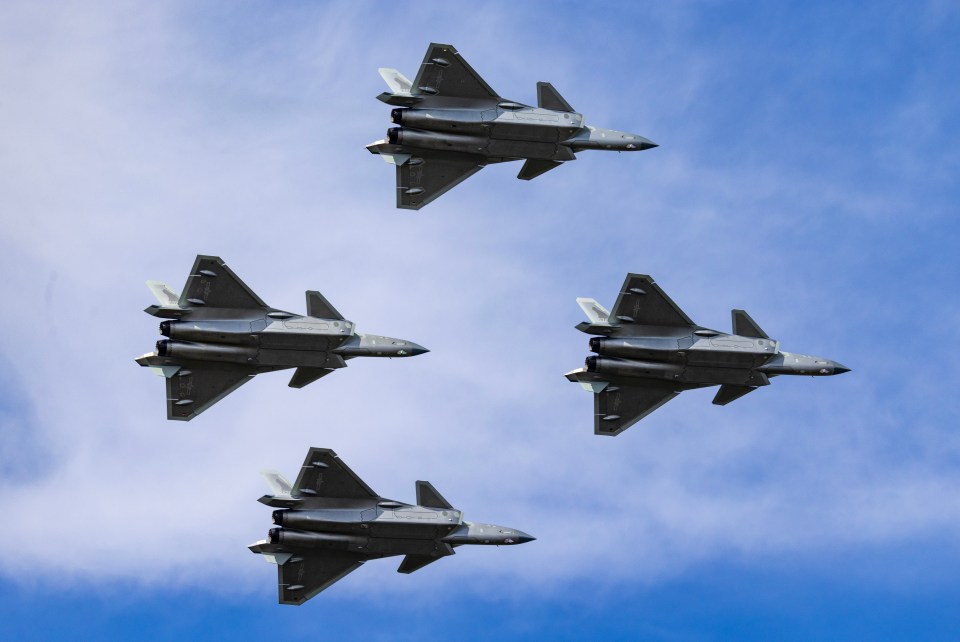CHINESE fighter jets staged a fake attack on one of the Royal Navy’s warships as it sailed through the contentious Taiwan Strait.
Xi Jinping’s war posturing comes amid growing concerns of an invasion and annexation of neighbouring Taiwan.
GettyChinese fighter jets performing military exercises[/caption]
HMS Richmond launches a missile during a joint US and British exercise
HMS Richmond was travelling through the disputed area of the South China Sea earlier this month when it was targeted by Beijing‘s “constructive kills”.
The ship formed part of the UK’s carrier strike group and was sailing alongside the US destroyer USS Higgins.
Chinese fighter jets made a “simulated kill” against the British ship – a missile launch without actual fire.
Officers onboard the convoy, led by HMS Prince of Wales, said the forces were “pretending to kill us” as they passed through the contentious area.
Sub-Lt Rohan Lewis, from the HMS Prince of Walesleading the group of vessels, added the Chinese were “trying to harass us”.
He told the Telegraph: “The Chinese were trying to harass us, four or five of them trying to get close. They tried to push us a little bit to see how far they can go.”
Another officer added: “They gain height, then pull away and turn at 50 degrees. It’s an info-war operation – they want us to know they’re targeting us.
“We were expecting a reaction but not of a violent nature – we were confident that they wouldn’t really fire a missile.”
Despite China’s attempted threats, however, the phoney attacks helped British forces understand more about Chinese military tactics.
The experience proved “mutually beneficial”, said one officer.
The Taiwan Strait separates China from the island of Taiwan – a self-governing country that Beijing claims should be under its control.
China considers the strait to be its own territorial waters, with a military spokesperson calling the Anglo-American voyage a “harassment and provocation”.
The move “sent wrong signals and undermined peace and stability in the Taiwan Strait”, Senior Colonel Shi Yi said.
He added: “The command remains on high alert and is committed to safeguarding national sovereignty and ensuring regional peace and stability.”
But other countries, including Britain and America, consider much of the strait to be international waters.
US Indo-Pacific Command spokesperson Major Jason Welch told Newsweek the vessels “conducted a routine Taiwan Strait transit” where “freedoms of navigation and overflight apply in accordance with international law“.
“The ships transited through a corridor in the strait that is beyond the territorial sea of any coastal state,” he added.
Chinese President Xi Jinping speaks during a military parade
Xi Jinping‘s brazen war posturing comes amid increased fears he is about to annex Taiwan – a move that could throw the whole region into turmoil.
The island has never been under the control of the communist regime in Beijing, and has its own government, military and currency.
But dictator Xi Jinping believes Taiwan to be a breakaway province of China, and has refused to rule out use of force to annex it.
The United States does not officially recognise Taiwan, but it routinely supplies arms to its government.
Mounting tensions in the region have led to fears that China could be preparing for an invasion as soon as 2027.
PAHMS Richmond as part of the UK’s carrier strike group[/caption]
Why does China want Taiwan
by Sayan Bose
TAIWAN insists it is an independent nation after splitting from mainland China amid civil war in 1949.
But China claims Taiwan remains a part of its territory with which it must eventually be reunified – and has not ruled out the use of force to take the island and place it under Beijing’s control.
The island, which is roughly 100 miles from the coast of south-east China, sees itself as distinct from the Chinese mainland, with its own constitution and democratically-elected leaders.
Taiwan sits in the so-called “first island chain”, which includes a list of US-friendly territories that are crucial to Washington’s foreign policy in the region.
This also puts it in an ideal situation to slow a Chinese attack on the West.
And with tensions between the two nations high, Taiwan is likely to aid China’s enemy if it means keeping its independence.
Taiwan’s economy is another factor in China’s desperation to reclaim the land.
If China takes the island, it could be freer to project power in the western Pacific and rival the US, thanks to much of the world’s electronics being made in Taiwan.
This would allow Beijing to have control over an industry that drives the global economy.
China insists that its intentions are peaceful, but President Xi Jinping has also used threats towards the small island nation.
In this years New Year’s address, President Xi even said that the people on both sides of the Taiwan Strait are one family.
He has previously called the independence of Taiwan a futile effort and that annexation by Beijing is a “historical inevitability”.

